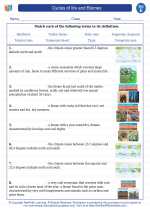Cycles of Life
In nature, there are various cycles that support life on Earth. These cycles include the water cycle, carbon cycle, nitrogen cycle, and oxygen cycle. Understanding these cycles is crucial for understanding how different organisms interact with their environment and how ecosystems are sustained.
The Water Cycle
The water cycle describes the continuous movement of water on, above, and below the surface of the Earth. It involves processes such as evaporation, condensation, precipitation, and runoff, and is essential for the distribution of water across different parts of the planet.
The Carbon Cycle
The carbon cycle is the movement of carbon between the atmosphere, oceans, biosphere, and geosphere. It involves processes such as photosynthesis, respiration, decomposition, and combustion, and is vital for regulating the amount of carbon in the atmosphere and sustaining plant and animal life.
The Nitrogen Cycle
The nitrogen cycle is the process by which nitrogen is converted between its various chemical forms. It involves processes such as nitrogen fixation, nitrification, assimilation, ammonification, and denitrification. This cycle is crucial for providing the essential nutrient nitrogen to plants and other organisms.
The Oxygen Cycle
The oxygen cycle involves the movement of oxygen within and between the atmosphere, biosphere, hydrosphere, and geosphere. It primarily involves processes such as photosynthesis, respiration, and combustion, and is fundamental for the survival of aerobic organisms.
Biomes
Biomes are distinct ecological communities characterized by unique climate, soil, and vegetation. There are several major biomes, including rainforests, deserts, grasslands, temperate forests, taiga, and tundra. Each biome has its own set of flora and fauna adapted to its specific environmental conditions.
Rainforests
Rainforests are characterized by high levels of annual rainfall and dense tree canopies. They are home to a wide variety of plant and animal species and play a crucial role in regulating the Earth's climate and oxygen levels.
Deserts
Deserts are dry areas with little vegetation and low precipitation. They can be hot or cold and present unique challenges for the organisms that inhabit them, including specialized adaptations for conserving water.
Grasslands
Grasslands are characterized by vast expanses of grasses and few trees. They are found in both tropical and temperate regions and are home to grazing animals and diverse plant species.
Temperate Forests
Temperate forests have distinct seasons and are characterized by a variety of deciduous and coniferous trees. They are inhabited by diverse wildlife and provide important habitats for many species.
Taiga
The taiga, also known as boreal forest, is a biome characterized by coniferous forests and long, cold winters. It is found in the high northern latitudes and supports a range of cold-adapted plant and animal species.
Tundra
The tundra is a cold and treeless biome with a layer of permanently frozen subsoil. It is home to hardy organisms adapted to extreme cold and a short growing season.
Study Guide
- What are the four main cycles that support life on Earth?
- Describe the processes involved in the water cycle.
- Explain the importance of the carbon cycle for sustaining life.
- How does the nitrogen cycle provide essential nutrients to organisms?
- What are the characteristics of rainforests, and why are they important?
- Discuss the challenges and adaptations of organisms in desert biomes.
- Compare and contrast grasslands and temperate forests.
- Where is the taiga biome located, and what types of organisms inhabit it?
- What are the defining features of the tundra biome?
◂Science Worksheets and Study Guides Fifth Grade. Cycles of life and Biomes
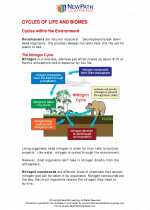
 Worksheet/Answer key
Worksheet/Answer key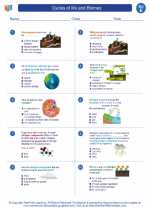
 Worksheet/Answer key
Worksheet/Answer key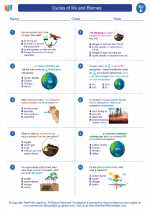
 Worksheet/Answer key
Worksheet/Answer key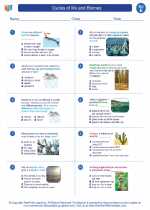
 Worksheet/Answer key
Worksheet/Answer key
 Vocabulary/Answer key
Vocabulary/Answer key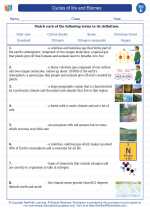
 Vocabulary/Answer key
Vocabulary/Answer key